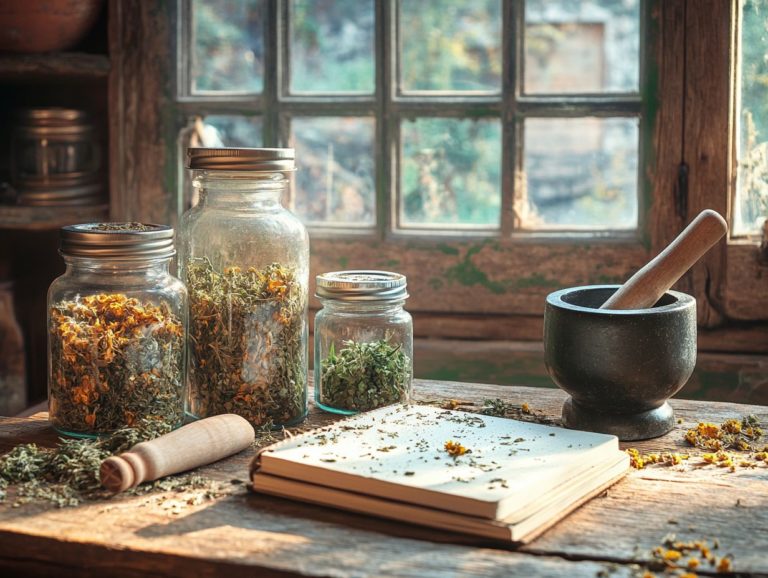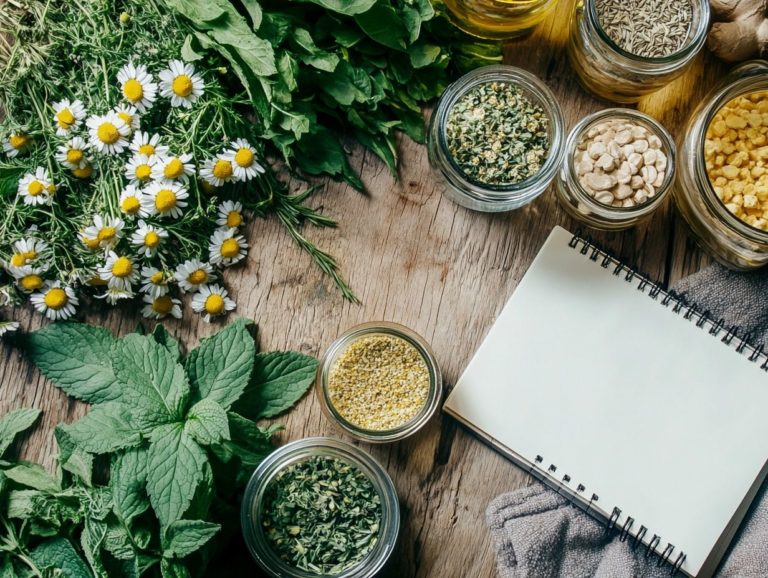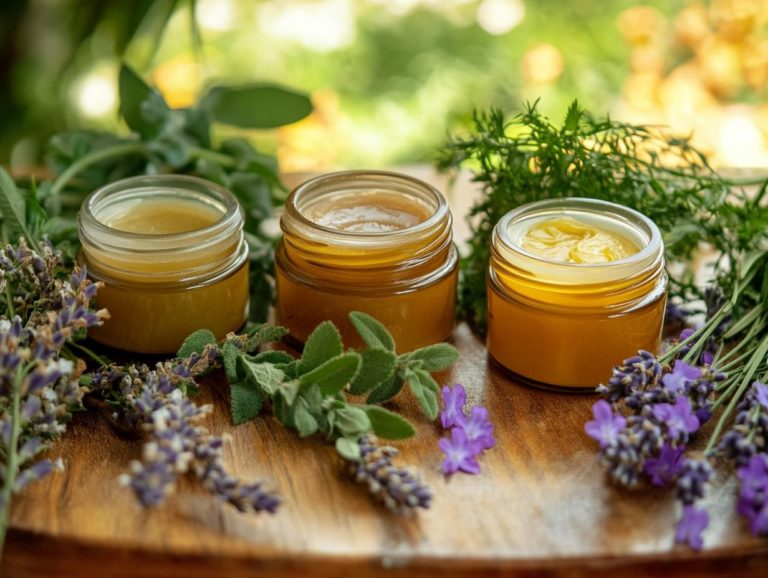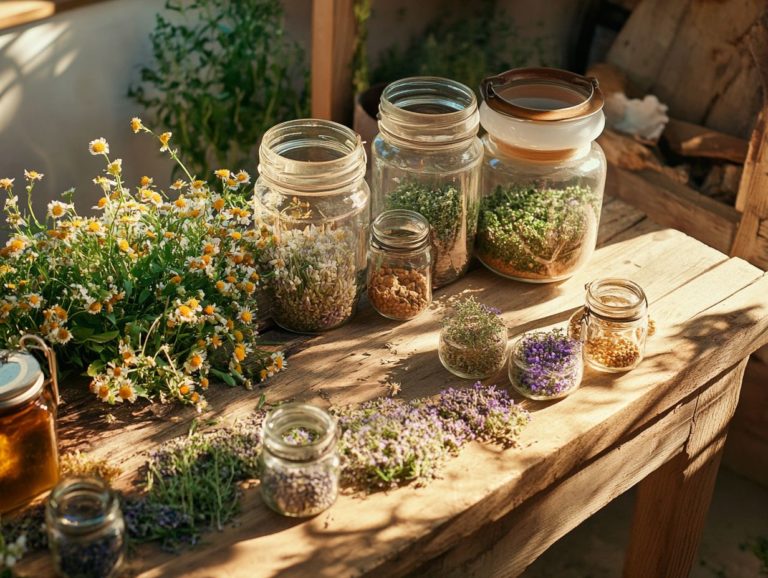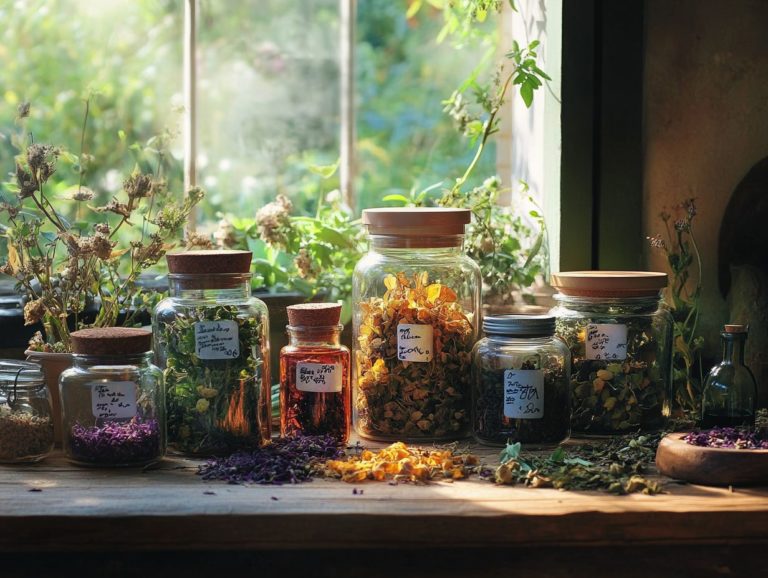How to Find a Qualified Herbal Practitioner?
Herbal medicine has surged in popularity as a natural alternative for enhancing health and well-being. However, diving into this realm can seem daunting.
Understanding the basics of herbal medicine and finding a qualified practitioner are crucial steps for anyone considering this whole-person approach. Let s dive into what you need to know about herbal medicine!
With the right knowledge and support, you can embark on a fulfilling journey toward natural healing.
Contents
- Key Takeaways:
- Understanding Herbal Medicine
- Qualifications of a Herbal Practitioner
- Researching and Choosing a Herbal Practitioner
- Questions to Ask During a Consultation
- Tips for Working with a Herbal Practitioner
- Alternative Options for Herbal Treatment
- Frequently Asked Questions
- 1. How do I know if a herbal practitioner is qualified?
- 2. Can I trust online directories when searching for a qualified herbal practitioner?
- 3. What questions should I ask a herbal practitioner before seeking their services?
- 4. Is it necessary to have a consultation with a herbal practitioner before starting treatment?
- 5. How can I find a qualified herbal practitioner in my area?
- 6. Are there any red flags to look out for when choosing a herbal practitioner?
Key Takeaways:

Here are some essential tips to help you choose the right herbal practitioner:
- Always research the educational background and certifications of a herbal practitioner before seeking their services. This ensures they are qualified and knowledgeable in herbal medicine.
- When choosing a herbal practitioner, consider their experience, specialization, and approach to treatment. This helps you find the right practitioner for your specific needs and health goals.
- Establishing a good relationship and open communication with your herbal practitioner is essential for a successful treatment journey. Be sure to ask questions and provide feedback throughout the process.
Understanding Herbal Medicine
Understanding herbal medicine invites you to explore the rich variety of medicinal herbs. These herbs are cherished for their healing properties across diverse cultures, from Tibetan Medicine to ancient traditions.
This whole-person approach taps into the plant kingdom and reveals time-honored methods of herbal treatment passed down through generations.
For example, herbalism in England emphasizes the significance of individual herbs, laying a solid foundation for both practitioners and home apothecaries. Many herbalists now offer international shipping of their remedies, serving a global audience eager for natural health solutions.
What is Herbal Medicine?
Herbal medicine represents a whole-person approach to health that uses the therapeutic properties of medicinal herbs, often celebrated for their remarkable benefits. This ancient practice combines various philosophies and promotes wellness by using nature s resources.
As you explore herbal treatment, you ll find practitioners emphasizing the body’s innate ability to heal itself. They utilize various forms, including tinctures (liquid extracts of herbs), teas, capsules, and salves (ointments made from herbs), each designed to support your journey toward health.
By tapping into the abundant benefits of plants, herbalism offers you relief from pain, a reduction in stress, and a boost in vitality. This makes it a valuable complement to conventional medical therapies.
The beauty of herbal remedies lies in their customization, allowing you to effectively address your unique health concerns.
Qualifications of a Herbal Practitioner
The qualifications of a herbal practitioner are crucial in ensuring that you receive effective and safe herbal treatments tailored to your unique health needs. A strong educational foundation is essential, complemented by proper certifications from reputable institutions like the School of Evolutionary Herbalism.
Many practitioners also gain invaluable experience through herbalist consultations and clinical practice. This not only enhances their expertise but also ensures they adhere to the standards set by professional bodies such as the National Institute of Medical Herbalists and the American Herbalists Guild. Additionally, knowing how to choose quality herbal products can further support their practice.
Educational Background and Certifications
As an aspiring herbal practitioner, prioritize building a strong educational background in herbal medicine. Focus on the study of medicinal herbs and their applications.
This solid foundation empowers you to diagnose conditions and recommend suitable herbal remedies.
Consider noteworthy institutions like The Complete Herbal Tutor, which offer comprehensive training programs that delve into both the art and science of herbal practices. Pursuing certifications from esteemed organizations such as the American Herbalist Guild can enhance your credibility and ensure adherence to rigorous industry standards.
Many training programs emphasize practical skills, helping you refine your ability to formulate herbal products and interact effectively with clients.
This comprehensive approach will deepen your expertise and prepare you for a thriving career in the expanding realm of herbal medicine.
Researching and Choosing a Herbal Practitioner

Researching and selecting the right herbal practitioner is essential for anyone keen on exploring herbal remedies. The effectiveness of your treatment hinges significantly on the practitioner’s knowledge and experience.
Consider their educational background, certifications, and previous consultations or case studies that showcase their ability to provide personalized care.
Understanding their approach to herbalism whether rooted in Tibetan Medicine, Traditional Chinese Medicine, or other holistic practices can profoundly impact your treatment journey.
Factors to Consider
When selecting a herbal practitioner, consider several key factors to ensure a fruitful therapeutic relationship. Look into their educational credentials, areas of expertise, and the range of herbal treatments they provide.
The availability of consultations plays a significant role in your decision-making process. An experienced herbalist familiar with various herbal traditions often possesses a deep understanding that allows them to tailor treatments to your individual needs.
Building a personal rapport with your practitioner enhances communication and fosters the trust necessary for effective healing.
Check reviews and testimonials, as well as the practitioner s approach to blending herbal remedies with conventional medicine.
All these elements create a well-informed and enriching experience on your journey towards holistic health.
Questions to Ask During a Consultation
Asking the right questions during your consultation with a herbal practitioner is essential for gaining insight into their approach and ensuring you receive a herbal treatment that is meticulously tailored to your unique needs.
Focus on essential inquiries about their experience, educational background, and treatment philosophies.
Don’t hesitate to ask specific questions about individual herbs and their medicinal properties.
Engaging in these discussions can also illuminate the practitioner s methods, whether they are rooted in ancient traditions, modern herbalism, or systems like Ayurveda and Traditional Chinese Medicine.
Important Inquiries for Finding the Right Practitioner
When seeking a suitable herbal practitioner, ask the right questions to illuminate their expertise, methodologies, and treatment philosophies.
Understanding their approach to consultations gives you insight into how they engage with clients and customize treatments to meet individual needs.
Gaining insight into their experiences with specific conditions like digestive issues or chronic pain can be enlightening.
Inquire about their knowledge of herbal medicine to reveal the types of remedies they prefer and the guiding principles of their practice. This can significantly impact treatment effectiveness.
Through these conversations, you can better determine whether a practitioner’s background aligns with your health goals.
Tips for Working with a Herbal Practitioner
Establishing a strong relationship and effective communication with your herbal practitioner is crucial for making the most of your herbal treatment and outcomes. It s vital to be transparent about your health history, current concerns, and any medications you’re taking, as this information enables the practitioner to tailor solutions specifically for you.
Engage actively in the consultation by asking questions and offering feedback to significantly enhance the effectiveness of your treatment plan.
Establishing a Good Relationship and Communication

Open communication makes this connection thrive, enabling both you and your practitioner to express expectations and concerns freely. Your herbal practitioner relies on accurate information from you to tailor treatments effectively, ensuring that the remedies selected align perfectly with your individual needs.
Fostering trust throughout this collaborative process is vital. When you feel safe and understood, you re more likely to adhere to treatment plans and provide honest feedback. This synergistic approach maximizes the benefits of herbal remedies and empowers herbal practitioners to adjust strategies, ultimately leading to more personalized care and improved health results.
Alternative Options for Herbal Treatment
Explore alternative options for herbal treatment! You re empowered to find natural remedies that work for you. Beyond conventional herbalist consultations, a wealth of herbal products and methods awaits your discovery.
Create a home apothecary to weave herbalism into your life. Use the medicinal power of herbs right from your kitchen. Moreover, many herbalists provide specialized products tailored to specific health needs, often supported by the latest research and clinical insights from herbal medicine clinics.
Start embracing these options today to elevate your wellness journey!
Other Herbal Products and Methods
You have a variety of herbal products to boost your health. Think soothing herbal teas that encourage relaxation and support digestive health, or potent tinctures that capture the essence of plants for maximum benefit. Essential oils, extracted from flowers and herbs, can function as both aromatic enhancers and therapeutic agents when used in diffusers or applied topically.
Incorporating these elements into your daily routine is effortless. For example, enjoying a calming peppermint tea in the evening can help you unwind after a hectic day. Adding a few drops of lavender oil to your bath can transform it into a spa-like retreat, reflecting the ancient lore of herbalism from cultures such as Tibetan Medicine and Traditional Chinese Medicine, which emphasize the use of herbal remedies for better health.
A thoughtfully curated home apothecary, a collection of herbal remedies, not only provides easy access to these natural solutions but also empowers you to take control of your wellness journey with personalized approaches inspired by the teachings of Sajah Popham and Anne McIntyre.
Frequently Asked Questions
1. How do I know if a herbal practitioner is qualified?
Check for certifications from organizations like the American Herbalists Guild and National Institute of Medical Herbalists. Verify their education and experience in herbal medicine.
2. Can I trust online directories when searching for a qualified herbal practitioner?

Researching is key to finding a trustworthy herbal practitioner! Make sure to check the credibility and reputation of the online directory before using it. Look for reviews and ratings from previous clients to ensure the accuracy of the herbal medicine information provided.
3. What questions should I ask a herbal practitioner before seeking their services?
Don t wait to ask questions! Inquire about what they specialize in, their treatment methods, and their success rates. You might also want to ask about payment options and any potential side effects of the herbal remedies they use, drawing on their holistic practice.
4. Is it necessary to have a consultation with a herbal practitioner before starting treatment?
A consultation with a clinical herbalist is essential. This allows you to discuss your medical history, current health concerns, and any medications you are taking. With this information, the herbal practitioner can create a personalized treatment plan for you, which may include Ayurveda a traditional Indian medicine system and insights from the plant kingdom.
5. How can I find a qualified herbal practitioner in my area?
You can start by asking friends and family for recommendations. Additionally, search online for local herbal practitioners and read reviews from their previous clients. Look for professional directories to help guide your search.
6. Are there any red flags to look out for when choosing a herbal practitioner?
Be cautious of practitioners who make unrealistic promises or claim to cure all health conditions with their herbal treatments. It s also crucial to avoid those who are not transparent about their qualifications, including their affiliations with professional organizations.
Are you ready to find the right herbal practitioner for you? Start your search today or reach out for a consultation!

